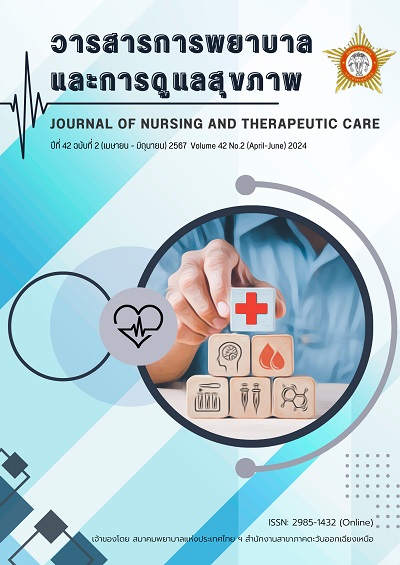ผลของโปรแกรมพัฒนาความฉลาดทางอารมณ์ต่อความฉลาดทางอารมณ์ของ นักศึกษาพยาบาลศาสตร์ ชั้นปีที่ 1 วิทยาลัยพยาบาลบรมราชชนนี นครราชสีมา
คำสำคัญ:
ความฉลาดทางอารมณ์, โปรแกรมการพัฒนาความฉลาดทางอารมณ์, นักศึกษาพยาบาลบทคัดย่อ
วิจัยครั้งนี้เป็นการวิจัยกึ่งทดลองแบบสองกลุ่มวัดก่อนและหลังเข้าร่วมโปรแกรมการพัฒนาความฉลาดทางอารมณ์มีวัตถุประสงค์การวิจัยเพื่อ 1) ศึกษาระดับความฉลาดทางอารมณ์ของนักศึกษาพยาบาล ชั้นปีที่ 1 และ 2) ศึกษาผลของโปรแกรมพัฒนาความฉลาดทางอารมณ์จาก 2.1)เปรียบเทียบความฉลาดทางอารมณ์กลุ่มทดลองก่อนและหลังเข้าร่วมโปรแกรมและ 2.2) เปรียบเทียบความฉลาดทางอารมณ์ระหว่างกลุ่มทดลองและกลุ่มควบคุมหลังเข้าร่วมโปรแกรม ผู้วิจัยพัฒนาโปรแกรม ฯ ขึ้น เพื่อพัฒนาครบองค์ประกอบของความฉลาดทางอารมณ์ดี เก่ง และสุข ของกรมสุขภาพจิตกระบวนการกลุ่มประยุกต์ใช้แนวคิดทฤษฎียึดผู้เรียนเป็นศูนย์กลางและการเรียนรู้จากประสบการณ์ โปรแกรมมี 10 กิจกรรม เข้ากลุ่มสัปดาห์ละ 2 ครั้ง ครั้งละ 60-90 นาที คัดเลือกกลุ่มตัวอย่างโดยการสุ่มแบบง่าย จากผู้ที่มีคะแนนความฉลาดทางอารมณ์ต่ำกว่าปกติถึงเกณฑ์ปกติได้จำนวน 26 คน แล้วแบ่งเป็นกลุ่มทดลองและกลุ่มควบคุมกลุ่มละ 13 คน เครื่องมือในการวิจัยมี 1) แบบวัดความฉลาดทางอารมณ์ หาความเชื่อมั่นโดยการหาค่าสัมประสิทธิ์แอลฟา เท่ากับ 0.91 และ 2) โปรแกรมพัฒนาความฉลาดทางอารมณ์ หาความตรงเชิงเนื้อหามีค่าดัชนีความสอดคล้องระหว่าง 0.67 – 1.00
ผลการวิจัยพบว่า ระดับ EQ ของนักศึกษาพยาบาล ชั้นปีที่ 1 โดยรวมอยู่ในเกณฑ์ปกติ มากที่สุด ร้อยละ 50.30 และรองลงมาอยู่ในระดับสูงกว่าปกติ ร้อยละ 35.86 ความฉลาดทางอารมณ์ของกลุ่มทดลองหลังเข้าร่วมโปรแกรมสูงกว่าก่อน อย่างมีนัยสำคัญทางสถิติที่ระดับ .05 ความฉลาดทางอารมณ์หลังการเข้าร่วมโปรแกรมของกลุ่มทดลองสูงกว่ากลุ่มควบคุมอย่างมีนัยสำคัญทางสถิติ .05 ประโยชน์ที่ได้สามารถส่งเสริมการใช้โปรแกรมพัฒนาความฉลาดทางอารมณ์ดังกล่าวกับนักศึกษาพยาบาลหรือนักศึกษาที่มีคุณลักษณะใกล้เคียงกันให้มีความฉลาดทางอารมณ์เพิ่มมากขึ้นเพื่อประสิทธิภาพในการปรับตัวต่อการเรียนในวิชาชีพพยาบาลต่อไป
Downloads
เอกสารอ้างอิง
Goleman D. Emotional intelligence: why it can matter more than IQ. London: Bloomsbury; 1996.
Ministry of Education. National education plan 2017–2036. Bangkok: The Ministry; 2017. (in Thai)
Panjiang P. Factors affecting emotional quotient and a model of emotional quotient development of students in higher education institutions in Songkhla province [Internet]. 2015 [cited 2024 Feb 20]. Available from: https://kku.world/lolno (in Thai)
Salovey P, Mayer JD. Emotional intelligence. Imagination, cognition and personality. 1990;9(3):185–211.
Department of Mental Health. A manual for youth skills development activities on “Thinking practice, problem solving, and EQ development” for volunteers. Leader of the Center for Friends, TO BE NUMBER ONE. 2nd ed. Nonthaburi: The Department; 2015. (in Thai)
Jansook C, Jansook N. Effects of group activities on emotional quotient of nursing [Internet]. 2017 [cited 2024 Mar 17]. Available from: https://kku.world/nxxpc (in Thai)
Freshwater D, Stickley T. The heart of the art: emotional intelligence in nurse education. Nurs Inq. 2004;11(2):91–8.
Lohmae U, Yeepaloh M, Kajornkittiya K, Bunlap P. Factors related to adaptations of the first year nursing students studying at a nursing college in a southern border province of Thailand. Journal of Nursing and Health Research. 2021;22(3):135–46. (in Thai)
Mayer JD, Salovey P. What is emotional intelligence? In: Salovey P, Sluyter DJ, editors. Emotional development and emotional intelligence: educational implications. New York: Basic Books; 1997. P. 3–31.
Adler RB, Towne N. Looking out/looking in. 10th ed. Australia: Wadsworth; 2002.
Songsri C. Stress and coping with stress among nursing students undertaken the elderly nursing practice course, Boromarajonani College of Nursing, Udon Thani. Nursing Health and Education Journal. 2022;5(3):13–24. (in Thai)
Tosangwarn S, Juntarawiwat, T. Stress, depression, coping strategies and resilience of nursing students at an institution in Northeast Thailand during the outbreak of the covid-19 virus. Journal of Psychiatric Nursing and Mental Health. 2023;37(3):92–113. (in Thai)
Hatthapanom W, Sriwiset S. A guide to group supportive psychotherapy for relatives of psychiatric patients. Khon Kaen: Khon Kaen Psychiatry Hospital; 2006. (in Thai)
Rogers CR. Client-centered therapy: its current practice, implications, and theory. Boston: Houghton Mifflin; 1951.
Kolb DA. Experiential learning: experience as the source of learning and development. 2nd ed. Upper Saddle River (NJ): Pearson Education; 2015.
Cohen J. Statistical power analysis for the behavioral sciences. 2nd ed. Hillsdale (NJ): L. Erlbaum Associates; 1988.
Kongsat S, Thummwong T. Determining the reliability of the questionnaire [Internet]. 2015 [cited 2024 Mar 17]. Available from: https://kku.world/iyjsc
Watcharasin N. Competency: self- development of security personnel to keep pace with changes in Thailand 4.0. Journal of MCU Humanities Review. 2019;5(2):253–64. (in Thai)
Srisongkhram W, Rattanasunya S, Pojpatthanaphon R, Thepprasit P. General psychology. Bangkok: Triple Education; 2006. (in Thai)
Ukkakimapan J, Tepvorachai U, Sompittayanurak N, Tareepean N. The emotional quotient of nursing students Pathum Thani University. Journal of Nakhonratchasima College (Humanities and Social Sciences. 2021;15(3):122–33. (in Thai)
Pongklum O, Klommake J, Pakluck P, Khuttamasoon T, Bunluesup W, Hongthong M. The emotional quotient among nursing students in a private university, Bangkok. The Journal of Faculty of Nursing Burapha University. 2017;25(3):9–19. (in Thai)
Thongied K, Chaiyaprom D. Emotional intelligence and stress of nursing students at Faculty of Nursing, Suratthani Rajabhat University. Suratthani Rajabhat Journal. 2018;5(2):213–31. (in Thai)
Lertchantharangkool T. Personality development techniques. Bangkok: SE-ED Publisher; 2019. (in Thai)
Inson A, Matrakul M, Sareeso P. Effects of emotional intelligence enhancement programme using interactive multimedia on emotional intelligence among nursing students. Journal of Social Science and Cultural. 2024;8(4):187–96. (in Thai)
Bundasak T, Chaowieng K, Tantisuwichwong S, Jangasem N, Yotkhamlue K. Effects of emotional intelligence enhancing program on social intelligence among nursing students. Journal of the Police Nurses. 2020;12(2):388–97. (in Thai)
Erkayiran O, Demirkiran F. The impact of improving emotional intelligence skills training on nursing students’ interpersonal relationship styles: a quasi-experimental study. Int J Caring Sci. 2018;11(3):1901–2.
Khumkom S. Effects of group activities on the development of emotional and resilience quotients of the first year nursing students of Suranaree University of Technology. Veridian E-Journal, Silpakorn University (Humanities, Social Sciences and Arts). 2018;11(2):2767–80. (in Thai)
Nuchsutham W, Kaewkunta P, Somboon L, Boonthai C, Muangmakham S. Effect of emotional quotient promoting program on emotional quotient among nursing students. Nursing Journal CMU. 2018;45(1):110–21. (in Thai)
Karahan TF, Yalçın BM. The effects of an emotional intelligence skills training program on the emotional intelligence levels of Turkish University students. Eurasian J Educ Res. 2009;(36):193–208.
Siriumpankul A. Effects of using program for developing emotional intelligence upon emotional intelligence of students. Panyapiwat Journal. 2019;11(2):275–90. (in Thai)
Boonmahome J, Kaneungchaisakul N, Pattanaphon O. Effect of guidance program on emotional intelligence and resilience of education undergraduate students. Journal for Social Sciences Research. 2020;11(1):76–90. (in Thai)
Chaksomsak N. Effects of emotion regulation and life skills program on emotional and social intelligence of university students. Journal of Psychiatric Nursing and Mental Health. 2023;37(3):1–14. (in Thai)
ดาวน์โหลด
เผยแพร่แล้ว
รูปแบบการอ้างอิง
ฉบับ
ประเภทบทความ
สัญญาอนุญาต
ลิขสิทธิ์ (c) 2024 วารสารการพยาบาลและการดูแลสุขภาพ

อนุญาตภายใต้เงื่อนไข Creative Commons Attribution-NonCommercial-NoDerivatives 4.0 International License.



